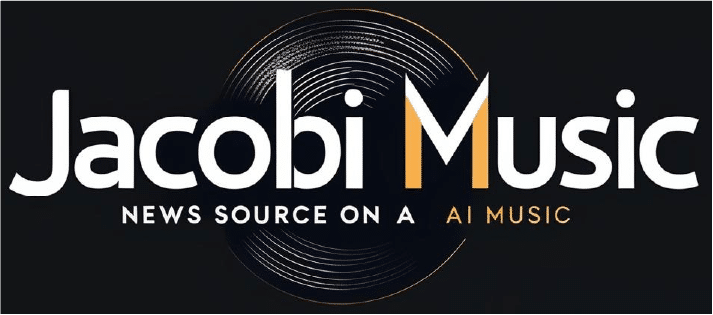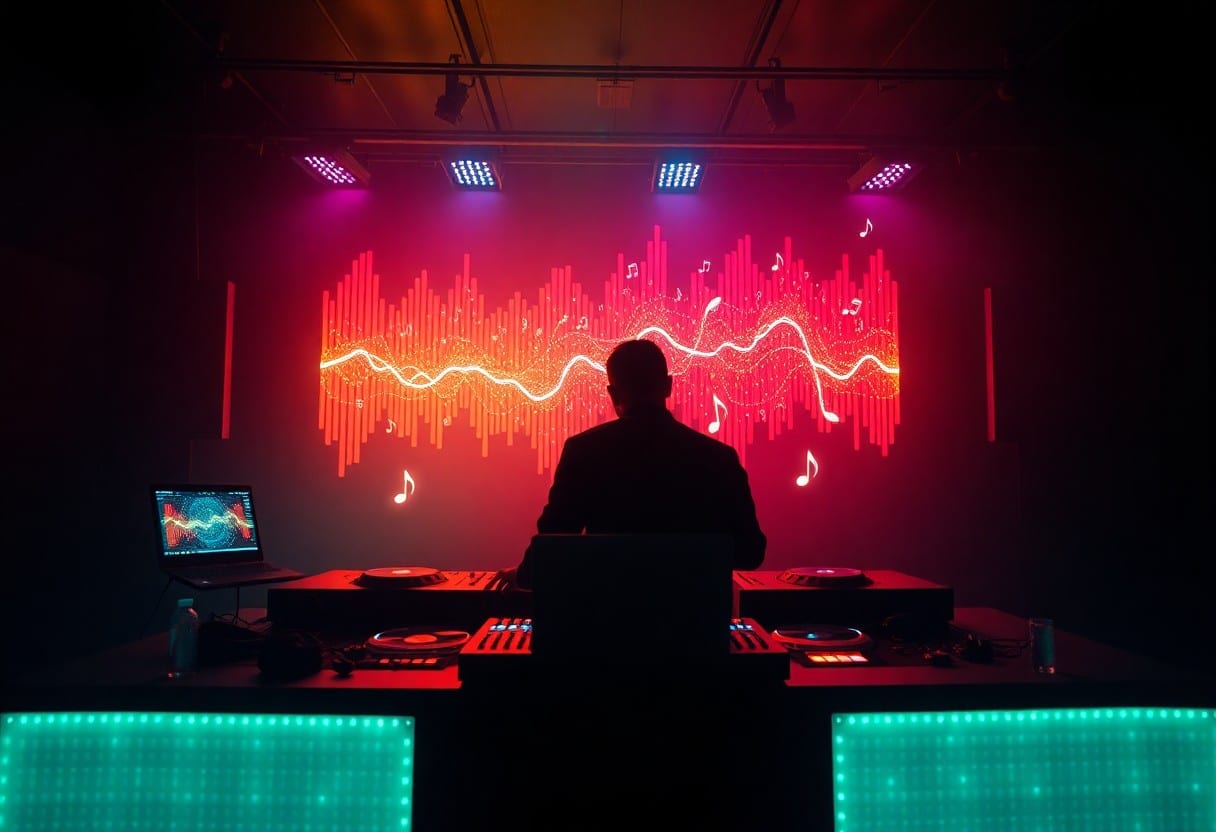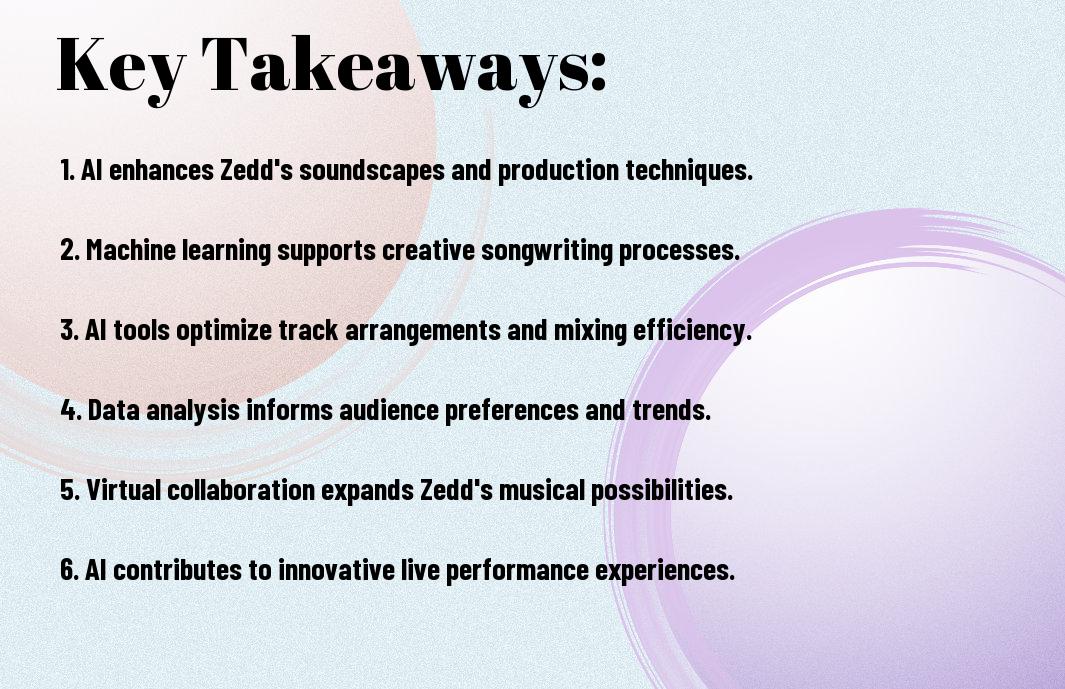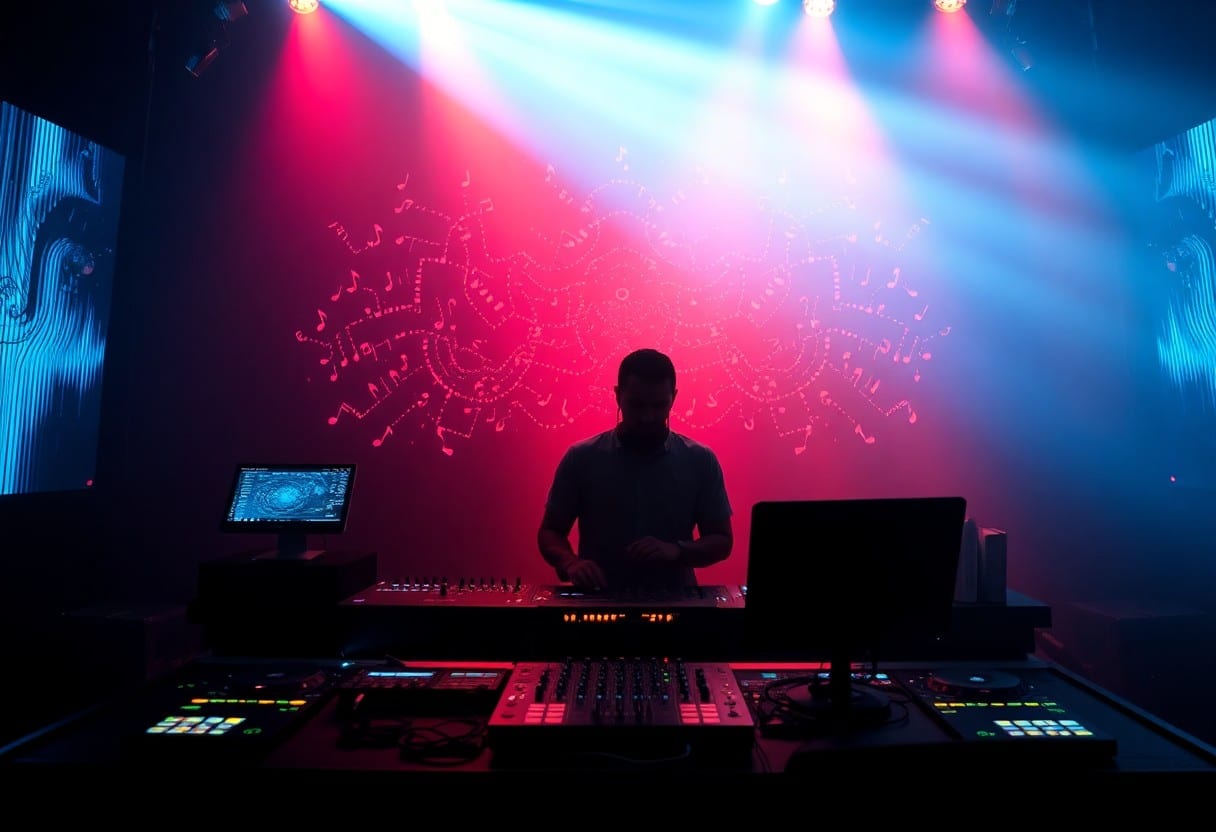It’s fascinating how artificial intelligence intertwines with music production, especially in the electronic hits of Zedd. As I explore this innovative integration, you’ll discover how AI contributes to crafting intricate sounds, enhancing compositions, and even predicting trends in music. You’ll gain insights into the technology behind Zedd’s chart-toppers and how it reshapes the creative process for artists today. Join me as we examine into the realm where technology meets artistry, revolutionizing the way we experience electronic music.
The Role of AI in Music Production
AI has transformed the music production landscape, allowing artists like Zedd to push creative boundaries. With AI-driven tools, producers can analyze patterns, generate melodies, and enhance sound quality effortlessly. This technology not only streamlines the workflow but also inspires fresh ideas, making it easier for musicians to focus on innovation and artistry.
Algorithmic Composition Techniques
Between the rising capabilities of machine learning and the desire for originality, algorithmic composition techniques have gained significant traction. These systems analyze existing music trends and styles, enabling you to create new compositions tailored to specific genres or moods. Imagine having a digital collaborator that not only understands your musical preferences but also offers unique melodic and harmonic suggestions.
AI-Assisted Sound Design
After embracing AI, I found that sound design became an entirely new experience. AI-assisted tools can generate and manipulate sounds based on your specifications, allowing for unprecedented creativity in crafting unique sonic textures. This technology not only saves time but expands your creative palette, leading to innovative sounds that enhance your tracks.
Production using AI-assisted sound design means I can experiment with an array of sounds that would typically require extensive manual effort. By leveraging AI, I can create complex soundscapes and textures with just a few clicks. This not only elevates the quality of my tracks but also opens up a world of possibilities that weren’t feasible before, ultimately resulting in a richer listening experience for my audience.
Hit Tracks Analyzed
Even as the electronic music scene continually evolves, the integration of AI has quietly taken center stage in chart-topping hits. A Survey Reveals Over Half of Musicians Would Conceal their use of AI in music creation, highlighting the growing reliance on technology in crafting pop masterpieces. Zedd’s tracks serve as a perfect case study for examining how AI tools are reshaping the sonic landscape and compositional techniques within the genre.
Breakdown of “Clarity”
After analyzing “Clarity,” it’s evident that Zedd’s use of AI programming in crafting melodies and harmonies significantly influenced its commercial success. The track’s structured layers and rich textures reflect a well-thought-out compositional design, combining organic and synthetic sounds that resonate with listeners. Through AI-assisted production techniques, Zedd has achieved a sound that feels both captivating and innovative.
Exploration of “Stay”
One of Zedd’s notable tracks, “Stay,” showcases how AI can enhance emotional evocation in music. This collaboration with Alessia Cara utilizes advanced algorithms to optimize vocal arrangements and electronic elements, creating a powerful connection between the artist and the audience. The track’s intricate production holds a mirror to the potential of AI when blended with human creativity.
Due to the integration of AI in “Stay,” the track’s production resonated widely, amplifying its emotional core. The AI-driven tools refined the overall soundscape, creating an immersive auditory experience that perfectly complements Alessia Cara’s vocals. By employing AI, Zedd crafted a radio-ready anthem that captures the essence of longing and connection, ultimately solidifying the song’s popularity across various platforms. This blend of technology and artistry demonstrates how AI can enhance rather than replace human creativity in music.
AI and Collaboration with Artists
Despite the rapid advancement of technology, I find that AI in music production often enhances the collaborative process between artists. This innovative tool assists musicians like Zedd, allowing them to explore new sonic landscapes, refine their sounds, and push creative boundaries. By harnessing AI’s capabilities, artists can not only save time but also explore fresh ideas, making collaboration more fruitful and dynamic.
Working with Vocalists
By utilizing AI, I can analyze vocal performances and suggest improvements or alternatives, streamlining the recording process. This technology enables vocalists to explore different melodies and harmonies, offering new creative possibilities that might otherwise go unnoticed. I appreciate how AI not only aids in enhancing the final product but also fosters a collaborative environment that encourages artistic exploration.
Contributions from Other Producers
Around the world, producers are increasingly integrating AI into their workflows, leading to exciting collaborations that elevate music production. The use of AI tools allows for an exchange of ideas that blends various styles and genres, enriching the final output. I find it fascinating how different producers contribute unique perspectives, facilitated by AI, that ultimately enhance the creative process.
With various producers experimenting with AI, they can share their findings and innovations, helping to push the music industry forward. This continual exchange of ideas fosters a collaborative ecosystem where artists can draw on each other’s strengths. By weaving together different styles and approaches, AI facilitates a rich tapestry of sounds in Zedd’s electronic hits, showcasing the creativity of all involved.
Audience Reception and Impact
Keep in mind that the reception of Zedd’s AI-enhanced tracks is as varied as the music itself. Fans often express excitement over the innovative sounds and creative possibilities that AI brings to electronic music. These technological advances allow Zedd to experiment and push the boundaries of his style, resulting in tracks that resonate with both long-time listeners and newcomers alike.
Listener Response to AI-Enhanced Tracks
Above all, the response to AI-enhanced tracks from Zedd has been largely positive. Fans appreciate the fresh sounds and unique structure of songs that incorporate AI elements, finding them to be innovative yet familiar. This blend creates an intriguing experience, allowing listeners to engage with the music on different levels, sparking conversations about the future of electronic music.
The Evolving Fanbase
By continuously incorporating AI into his productions, Zedd attracts a broader fanbase that includes tech enthusiasts and curious listeners drawn to the futuristic aspect of music creation. His ability to fuse technology and artistry invites people from diverse backgrounds to connect over his tracks, enriching the overall experience and expanding the reach of his music.
Impacting the fanbase, this evolution fosters an inclusive community where technology lovers and traditional music fans intersect. As Zedd embraces AI, it invites discussions about artistry and innovation, encouraging fans to explore new interpretations of his work. The blending of genres and styles promotes a collaborative spirit among listeners, ultimately driving the electronic music scene forward into uncharted territory.
The Future of AI in Electronic Music
Unlike traditional music production processes, the future of AI in electronic music promises to revolutionize the way artists create and engage with sounds. By harnessing advanced algorithms and machine learning, you can anticipate an explosion of innovative tools that will streamline composition, enhance creativity, and expand the sonic possibilities available to musicians. We are only at the beginning of this technological journey, and the potential for AI to redefine genres and artistic collaboration is immense.
Innovations on the Horizon
Music creation is evolving rapidly, with AI-driven software emerging that can generate unique melodies, harmonies, and beats tailored to your preferences. These innovations not only simplify the production process but also allow for entirely new sounds and compositions that were previously unimaginable. You may find yourself collaborating with AI as a co-creator, pushing the boundaries of electronic music into uncharted territories.
Potential Ethical Considerations
Around the growing capabilities of AI in music, ethical questions arise regarding authorship, originality, and the impact on human musicians. As we embrace these technological advancements, you should consider how AI-generated compositions affect traditional notions of creativity and the role of the artist.
It is vital to navigate the ethical landscape as AI becomes more integrated into music-making. While AI can act as a powerful tool, it can also lead to questions about ownership and rights over AI-generated content. Additionally, reliance on technology might diminish the human aspect of creativity in music, influencing job opportunities for traditional musicians. By fostering open discussions around these issues, we can collectively shape a balanced relationship between technology and art that respects both innovation and human contribution.
To wrap up
Now, I’ve explored how AI has revolutionized Zedd’s electronic hits, enhancing both production quality and creative possibilities. You can appreciate how AI algorithms analyze trends and optimize sounds, shaping the electronic music landscape. As you explore deeper into Zedd’s tracks, you’ll notice the innovative layering and mastering techniques that AI facilitates. Understanding these elements not only elevates your listening experience but also highlights the collaboration between human artistry and technology. Embracing AI in music can inspire you as a creator or a fan, opening doors to new auditory dimensions.





No Comments